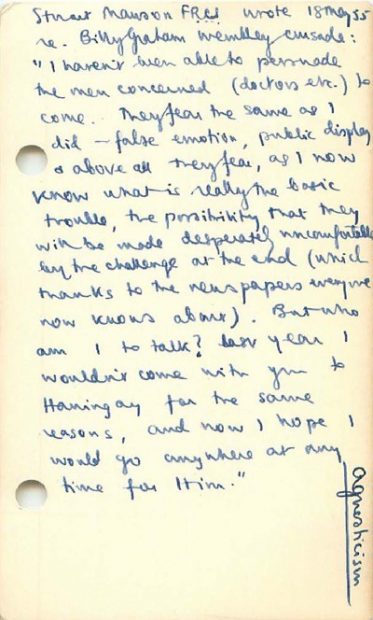For almost sixty years of his fruitful career as pastor, writer, and evangelical leader, John Stott used a system of note cards to keep track of quotations and stories that he wanted to use in his sermons and books. With the help of his faithful secretary Frances Whitehead, he filed these cards away in his office at All Souls Langham Place, the church in London where he pastored for many years. Here is one of those note cards, with the topic heading “Agnosticism” in the lower right corner:
After he died in 2011, these note cards were collected and transcribed (the transcription of the one above can be found later in this post). Mark Meynell, who served on staff at All Souls with Stott, has selected the very best of them to appear in The Preacher’s Notebook: The Collected Quotes, Illustrations, and Prayers of John Stott.
The Preacher’s Notebook comes in five sections. The three largest are made up of quotations, stories, and summaries on various issues, organized by topic. A fourth section consists of nine outlines for talks, and the fifth section consists of thirty-five prayers Stott wrote for use in worship. All of the entries in this collection have been given titles and labeled with themes to make them easier to find.
While most of the entries are quotations from other works that Stott wanted to categorize and remember, he occasionally wrote down personal theological reflections, stories from his own life, and quotations from letters he had received. Below is an example from the first category about the cross:
Not scales, but the cross
Themes: Forgiveness; Good Works; Jesus: Death; Justice; Justification
Crossing Waterloo Bridge and looking northeast, one has a fine view of the city skyline, and in particular of those two domed buildings, the Old Bailey (the central criminal court) and St. Paul’s Cathedral (the mother church). At the pinnacle of each dome is mounted a significant symbol. At the top of the Old Bailey stands the classical god of justice—blindfolded (for impartiality), wielding the sword of justice in her right hand, and holding a pair of scales (for the sifting of evidence) in the left. At the top of St. Paul’s however, is a great golden cross.
Many people think Christianity is a religion of the scales. They imagine that every time they sin, God flicks it into one pan, while every time they do a good deed, he flicks it into the other. And they are hoping against hope that the scales may just tip down in their favor.
But no, Christianity is not a religion of scales, but of the cross. For if the scales stand for our unfinished works, the cross stands for the finished work of Christ. It tells us Christ died for our sins once for all, that we are forgiven. It invites us to come to Christ saying, “Nothing in my hand I bring.”
An example from the second category, stories from Stott’s own life, is this story from his time at school:
“Nobody believes in the Trinity nowadays”
Themes: Doubt; God: Trinity
One of the most vivid and embarrassing memories of my schooldays is of a conversation with a visiting clergyman. I was about fifteen years old. And with the invincible assurance of teenage omniscience I said to him, “Nobody believes in the Trinity nowadays.” I’d no sooner said it than I was ashamed of it.
The fact is, I’d never thought about the Trinity. I just found it difficult to understand so I assumed it was an outmoded superstition, long since discarded by intelligent people. It is perhaps an example of the irony of God’s providence that on leaving school I went to Cambridge University—dedicated to the Holy Trinity!
This third example, a quote from a letter Stott received from a doctor about the response to Billy Graham during his second crusade in London, is what was written on the card above:
Fear of discomfort
Themes: Comfort; Doubt; Fear; Pride
Stuart Manson FRCS wrote [to me on] May 18, 1955, re: Billy Graham Wembley Crusade: “I haven’t been able to persuade the men concerned (doctors, etc.) to come. They fear the same as I did—false emotion, public display, and above all, they fear, as I now know what is really the basic trouble, the possibility that they will be made desperately uncomfortable by the challenge at the end (which, thanks to the newspapers, everyone now knows about). But who am I to talk? Last year I wouldn’t come with you to Harringay for the same reasons, and now I hope I would go anywhere at any time for Him.”
* * *
This invaluable resource is bound to be beneficial for any pastor. Pre-order The Preacher’s Notebook today!






